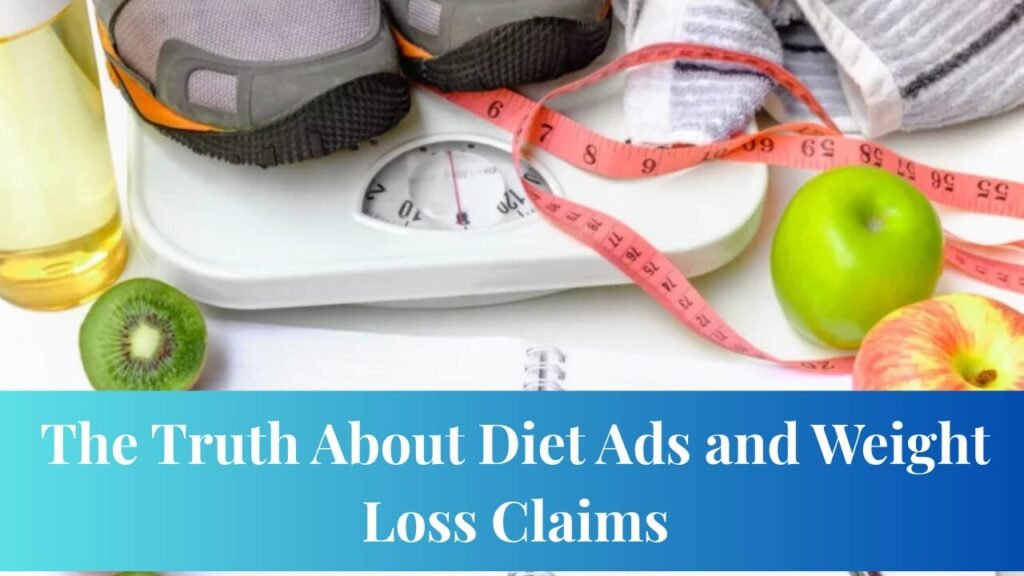The diet and weight loss industry has grown into one of the largest markets globally, with billions of dollars invested annually in products and services that claim to help people shed excess pounds. As a result, diet and weight loss advertisements have become omnipresent in our daily lives.
But how did this industry become so influential? And why do weight loss ads remain so effective?
The Psychological Appeal of Weight Loss Ads
The power of weight loss advertising lies in its ability to play on our emotions and desires. Advertisers know that weight loss is a common concern for many people, and they craft their campaigns to appeal directly to these feelings.
These ads often show “before and after” pictures that emphasize extreme transformations in short amounts of time, creating the illusion that rapid weight loss is not only possible but effortless.
What Makes Weight Loss Ads So Persuasive?
Weight loss ads are designed to catch your attention and keep you hooked. They use several tactics to persuade viewers, making them believe that they have found the solution to their weight problems.
Before-and-after photos are often used in weight loss advertising to show dramatic transformations. The promise of a quick fix is presented visually, though these photos may be altered or carefully staged to exaggerate the results. Celebrity endorsements are also common, giving the impression that if these well-known personalities are using a product, it must be effective. However, these endorsements are typically paid promotions and do not guarantee the results shown in the advertisements.
Urgency tactics such as “limited-time offers” or “act now” are used to push consumers into making quick decisions without taking the time to properly research the product. Some ads even claim that their products or services can help you lose weight with minimal effort, without diet or exercise. These “miracle cures” often lack scientific backing and may not be effective in achieving sustainable weight loss.
The Hidden Costs of Diet and Weight Loss Ads
Although these ads promise easy solutions, there are often hidden costs associated with following through on these promises. These costs aren’t always financial; they can also be physical, emotional, and psychological.
Financial Costs
Many weight loss products are expensive, and their costs may not be immediately apparent. Hidden fees, subscriptions, and recurring charges are common in this industry. Consumers may think they are purchasing a one-time product but later find themselves signed up for expensive programs or auto-renewal memberships. These financial burdens can add up quickly, leaving consumers feeling deceived.
Health Risks
Diet pills, supplements, and other weight loss products often advertise “effortless” weight loss. However, many of these products are unregulated and not tested for safety. Some can even be harmful to your health.
For example, certain weight loss pills contain stimulants or other harmful ingredients that can lead to side effects such as elevated heart rate, insomnia, and digestive problems.
Emotional Costs
The pressure to conform to society’s unrealistic beauty standards can take a toll on your mental health. The constant bombardment of weight loss ads can lead to feelings of inadequacy, body shaming, and even anxiety.
It’s essential to understand that your worth is not defined by your body size, and striving for a healthier lifestyle should be rooted in self-care, not the pursuit of an unattainable ideal.
How to Spot Misleading Diet Advertisements
With the rise of weight loss marketing, it’s more important than ever to develop a critical eye when assessing diet ads. Here’s how to spot misleading or deceptive advertisements.
Signs of a Misleading Diet Ad
Promises of rapid weight loss, such as losing 10 pounds in 10 days, should raise red flags. Sustainable weight loss typically happens gradually and requires consistent effort.
Many weight loss products lack credible scientific backing. If the ad does not provide studies, clinical trials, or expert opinions to support its claims, it’s best to proceed with caution. Vague product descriptions and overemphasis on before-and-after photos are also common tactics. While these images may look impressive, they are often edited or taken under controlled conditions. Without knowing the full context of these photos, they should not be the basis for your decision-making.
The Reality of Effective Weight Loss Programs
True and sustainable weight loss is not achieved overnight. While weight loss advertisements promise quick results, the reality is that losing weight takes time and requires a holistic approach.
Key Elements of an Effective Weight Loss Program
Balanced nutrition is key. An effective weight loss program promotes healthy eating habits, focusing on whole foods like fruits, vegetables, lean proteins, and healthy fats. The goal should be to create a balanced and nutrient-dense diet, not a restrictive one that is hard to maintain.
Regular physical activity is equally important. A good program will include a combination of cardiovascular exercise, strength training, and flexibility exercises to promote fat loss, build muscle, and improve overall health.
Mental Health and Professional Support
Weight loss is as much a mental and emotional journey as it is a physical one. An effective program should address emotional eating, stress management, and encourage healthy relationships with food.
Look for programs that offer guidance from registered dietitians, fitness trainers, or mental health professionals who can provide personalized support and create a plan tailored to your needs.
Frequently Asked Questions
What Are the Dangers of Following Weight Loss Ads Without Research?
Following weight loss ads without doing your own research can lead to financial loss, health risks, and disappointment. Many of these products are not backed by scientific evidence and may not deliver the results they promise. Additionally, some weight loss products can have harmful side effects, especially if they are not regulated by health authorities.
How Can I Evaluate a Weight Loss Product Before Buying?
To evaluate a weight loss product, check for scientific research or clinical studies that support the claims made by the product. Always consult with a healthcare provider before using any new supplement or weight loss program. Additionally, read customer reviews and check the product’s ingredient list for any potentially harmful substances.
Are There Any Reliable Weight Loss Programs?
Yes, there are reliable weight loss programs that focus on sustainable practices and long-term results. These programs usually involve a combination of healthy eating, regular physical activity, and emotional support. Look for programs that are designed by health professionals and focus on balanced nutrition and exercise, rather than quick fixes.
Why Do Celebrities Endorse Weight Loss Products?
Celebrities often endorse weight loss products because they have large followings, and their endorsements can help sell products. However, it’s important to remember that their endorsement does not guarantee the effectiveness of the product. Celebrities are paid to promote these products, and their personal results may not reflect those of the average person.
Can Weight Loss Products Work Without Diet and Exercise?
While some products may offer temporary results, the most effective and sustainable weight loss occurs through a combination of healthy eating and regular exercise. Weight loss products should not be seen as a substitute for a healthy lifestyle. Any program that claims you can lose weight without changing your diet or exercise habits should be viewed with skepticism.
Conclusion
Diet and weight loss advertisements can be enticing, but they often present an unrealistic picture of what weight loss looks like. Many of these ads prey on emotions and insecurities, promising quick fixes that are not sustainable or healthy. The key to successful and lasting weight loss lies in making informed decisions and focusing on long-term lifestyle changes that include balanced nutrition, regular physical activity, and mental health support.
Before purchasing any weight loss product or joining a weight loss program, do thorough research, consult with healthcare professionals, and prioritize your health above all else. Sustainable weight loss is a journey that takes time, effort, and patience. By being cautious and critical of misleading advertisements, you can find a weight loss program that truly works for you.




